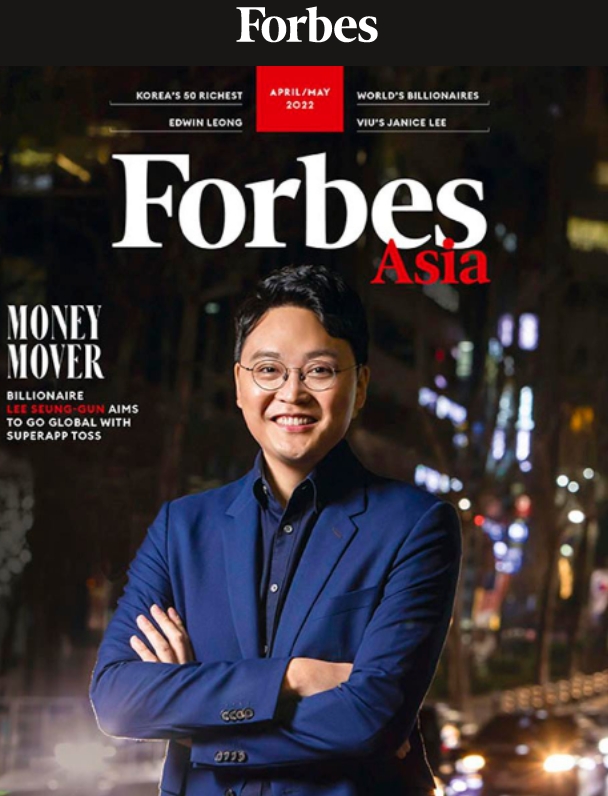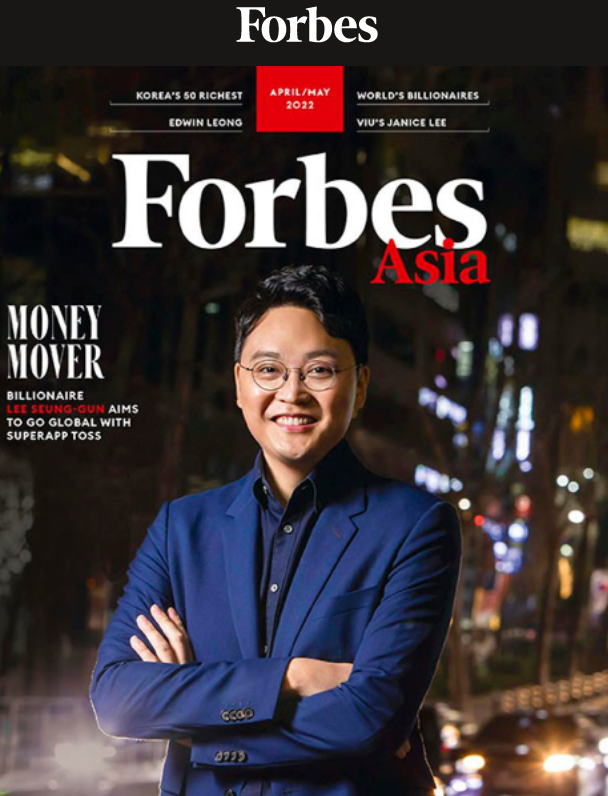
 Kim Beom-su of internet giant Kakao is No.1 for the first time
Kim Beom-su of internet giant Kakao is No.1 for the first time
The combined wealth of the tycoons on the 2022 Forbes list of Korea’s 50 richest declined by 17% to US$130 billion, from $156 billion in 2021. For the first time in a decade, none of the billionaires on the list has a double-digit fortune. The complete list is available here as well as in the April/May issue of Forbes Asia and the June issue of Forbes Korea.
Despite South Korea’s export-led economy growing 4% in 2021, its stock market was Asia’s second-worst performer over the past 12 months. As interest rates rose and investors retreated, the benchmark Kospi index fell 13% since fortunes were last measured in May 2021.
Kakao founder and self-made billionaire Kim Beom-su is the new No.1 with $9.6 billion. His fortune declined by $1 billion from last year, as a string of controversies weighed down the internet giant’s stock. Samsung’s Jay Y. Lee retains the No. 2 spot with $9.2 billion. His fortune too fell from $12.4 billion last year.
At No. 3 for the first time is private equity billionaire Michael Kim, who bucked the trend to become this year’s biggest gainer in both percentage and dollar terms. Kim more than doubled his net worth to $7.7 billion after New York-based Dyal Capital Partners acquired a minority stake in his privately held MBK Partners at a valuation of nearly $9 billion.
Last year’s list topper Seo Jung-jin slipped to No. 4 with $6.9 billion, down $5.6 billion, or 45%. Shares of his drug-maker Celltrion fell amid disappointment that its Covid-19 antibody treatment has yet to secure U.S. regulatory approval. Rounding out the top 5 on the list is Kwon Hyuk-bin of video games developer Smilegate, who also saw his fortune fall to $6.85 billion from $9.5 billion in 2021.
Coupang founder Bom Kim, who was last year’s biggest gainer following his company’s blockbuster IPO in March 2021, saw his net worth decline the most in percentage terms. As losses mounted at the New York Stock Exchange-listed e-commerce company, his wealth halved to $3.2 billion. The Harvard Business School dropout comes in at No. 14, down seven spots from last year.
Three out of the seven new faces this year are startup founders. Making his debut is fintech unicorn Viva Republica’s Lee Seung-gun (No. 36, $1.2 billion), who is also featured on the cover of the April/May issue of Forbes Asia. With a blockbuster funding round in the works, Lee is taking his finance superapp Toss to its next stage with a big push in Southeast Asia.
Other newcomers include Dunamu cofounders Song Chi-hyung (No. 9, $3.7 billion) and Kim Hyoung-nyon (No. 22, $1.95 billion), who run South Korea’s largest cryptocurrency exchange Upbit. Yoo Jung-hyun (No. 15, $3 billion) makes her debut following the sudden death of her husband, Kim Jung-ju, in February. Yoo’s 14% stake in online gaming giant Nexon, which she helped Kim start in 1994, was earlier combined with that of her late husband, whose estate is yet to be settled.
The sole returnees this year are brothers Cho Hyun-sang (No. 44, $1.01 billion) and Cho Hyun-joon (No. 47, $980 million) of industrial conglomerate Hyosung Group. Shares of its subsidiary Hyosung Advanced Materials, which makes carbon fiber used in hydrogen fuel-cell vehicles, soared on investor optimism for emission-free cars.
Notable among the nine drop-offs this year is the LG clan’s Koo Bon-joon, who donated a chunk of his LG shares to three charitable foundations and gave a part of his stake in holding outfit LX Holdings to his children.
The minimum amount required to make the list is $950 million, up slightly from $940 million in 2021.
The top 10 richest in South Korea are:
Kim Beom-su; US$9.6 billion
Jay Y. Lee; $9.2 billion
Michael Kim; $7.7 billion
Seo Jung-jin; $6.9 billion
Kwon Hyuk-bin; $6.85 billion
Hong Ra-hee; $6.4 billion
Chung Mong-Koo; $4.4 billion
Lee Boo-jin; $3.9 billion
Song Chi-hyung; $3.7 billion
Cho Jung-ho; $3.5 billion
The list was compiled using information from the individuals, analysts, government agencies, private databases, stock exchanges and other sources. Net worth numbers are based on stock prices and exchange rates as of the close of markets on April 1. Private companies were valued by using financial ratios and other comparisons with similar, publicly traded companies. The estimates can include a spouse’s wealth and, if the person is the company founder, the wealth of sons and daughters that is derived from that company. The list can also have those who are included due primarily to extensive business and residential ties to South Korea, or citizens who don’t reside in the country but have significant business or other ties to the country.